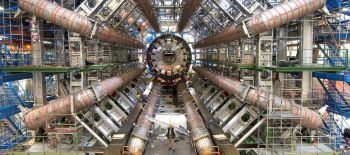Top physicists discuss what’s next for gravitational waves and particle physics
By: Jacqui Bealing
Last updated: Thursday, 17 March 2016

The ATLAS experiment at CERN's Large Hadron Collider in Geneva. Photo courtesy of Maximilien Brice
A physicist who worked on LIGO’s discovery of gravitational waves this year - regarded as one of the most important scientific breakthroughs since Einstein first predicted their existence 100 years ago - will give a keynote talk at a high-profile conference at the University of Sussex next week.
Dr Giles Hammond, reader in Physics and Astronomy at the University of Glasgow, is on campus for the Institute of Physics (IOP) joint annual High Energy Particle Physics (HEPP) and Astro Particle Physics Group’s (APP) conference from 21-23 March 2016.
His talk will focus on the opportunities presented by the field of astroparticle physics, including a description of the technology required for gravitational wave detectors and the importance of the LIGO results.
Also speaking is Dr Harry Cliff, in-house physicist at the Science Museum, who will be giving a public lecture on the new round of experiments about to take place at the Large Hadron Collider (LHC) at Cern, Switzerland, following on from the discovery of the Higgs boson in 2012.
Dr Cliff’s talk, entitled, ‘Into the unknown – what might we find at the LHC in 2016?’ is on 23 March in Chichester 1 Lecture Theatre (7pm).
More than 200 physicists from across the UK will be presenting and attending sessions at the conference that will focus on both experimental and theoretical physics. The themes include collider physics, neutrino physics, particle physics, particle physics detectors and astroparticle physics.
Accompanying the conference is an exhibition of photographs showing women scientists at work in Palestine. Created by photographers Kate Shaw and Jack Owen, the photo essay Women in Physics in the Palestinian Territories will be on display in Dine Central in Bramber House from 21-23 March.
